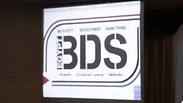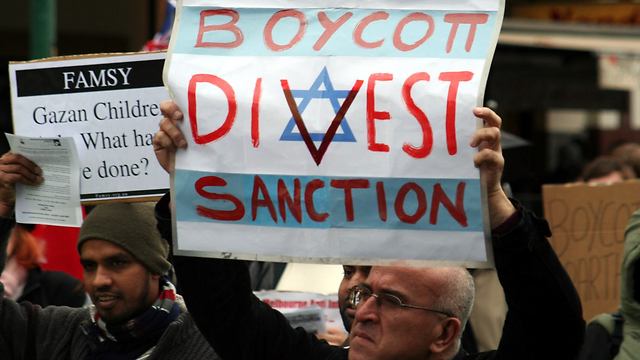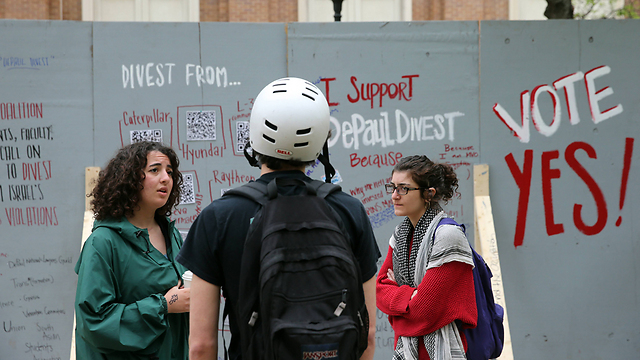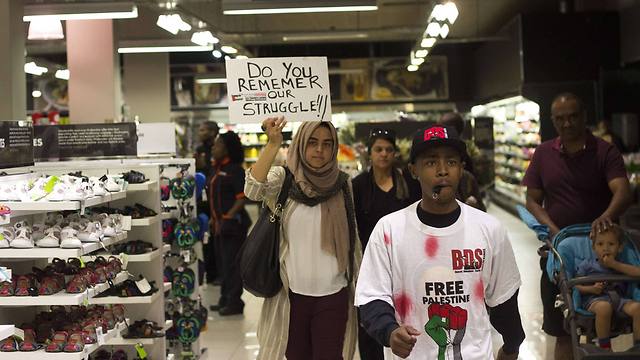
Rift in Foreign Ministry prevents effective fight against BDS
Division developed in the ministry after professionals urged cooperating with Jewish left-wing organizations to fight boycott, with politicians choosing to brand all criticism as anti-Semitism -- thus excluding potentially powerful voices.
Chairman of the Israel Farmers Federation, Meir Tzur, has encountered the boycotting of Israeli products too many times recently. "Just this month, three chains in England announced they won't work with Israel," he says with evident frustration.
"Every time I get a message like that, I feel the most hurt in the world, an outcast, and concerned. Thousands of farmers have already suffered in fields that until recently we were dominating; like flowers, cherry tomatoes, spices or peppers. But most of all my anger is directed at the government of Israel. We have been turning to any possible ministry for years now, warning them, telling them, asking for help, and it turns out we have been talking to a wall. The government is always indifferent; everyone is in denial about this, and not doing anything meaningful."
And Tzur is not the only one. The important battle against the Boycott, Divestment and Sanctions Movement (BDS) is being treated with reckless abandon, according to farmers, academics and others who have been suffering because of the boycott movement.
Is the reason for that truly indifference or denial, as Tzur claims? Or maybe it is the lack of resources and the fact there are too many cooks in the kitchen? And perhaps it is something entirely different.
According to sources we spoke to, one of the problems plaguing Israel's fight against the boycott movement and delegitimization efforts is actually clashes between the professional ranks, who are supposed to lead the charge, and the political leadership.
Related stories:
- Israel to allocate NIS 100m for BDS battle
- BDS websites see 33% increase in traffic over past year
- Hollande: France opposed to BDS movement
The rift includes criticizing anyone who dares to say there is a problem that needs addressing and pushing out organizations capable of fighting the boycott well because they criticize the government's policies.
Director of Policy and Strategy Eran Shayshon at the Reut Institute, one of the external agencies that has often advised the National Security Council, the Strategic Affairs Ministry and the Foreign Ministry, can attest to this firsthand.
Shayshon has been explaining to government representatives over the past few years that it is important to divide and drive a wedge between the leaders of the BDS campaign, but they were unable to reach a consensus on the issue, especially when it came to the political echelons.
"It is obvious that behind BDS there is an alliance of the radical left-wing and political Islam, but they are hiding their true intentions using liberal terminology," he says. "This is a small group, but its main goal is to expand and bring in strong economic entities from European mainstream whose criticism against Israel is far more moderate. And they have been successful with banks, large unions and public institutes. This is how they achieve the dangerous delegitimization of Israel.
"So for Israel, the key is to actually making a clear distinction between the extremists and the rest. The goal is to divide them. And that means to be open to listen to criticism from moderate voices against the government, in order to return the extremists back to their natural size. To achieve this goal, we explained to the government representatives that we have to operate with as large a base as possible; meaning, recruit not only right-wing agencies and groups to the fight, but also left-wing groups who criticize the government.
"The message for left-wing organizations is that criticism is legitimate, but there are red lines of terminology and entities with whom we cooperate. The message to the right is to adopt the paradox: The more left-wing a group speaking out against BDS is, the stronger its influence. We initiated meetings between government representatives and several Jewish left-wing organizations in Israel and abroad, but it did not bear any fruits. So we lost effective and good soldiers for the fight."
Among other things, meetings were held in Washington and in Israel between representatives of the Foreign Ministry and the Strategic Affairs Ministry with J-Street (which represents the Jewish left in the US), B'Tselem and others.
"It's a major missed opportunity," B'Tselem's former US Director Uri Zaki says. "I went to universities in the United States, specifically on Apartheid Week, in order to explain that I was an Israeli patriot, and to oppose the boycotts. Like the Jewish left-wing groups in America who joined the fight against the boycott, our position has great influence. It is true that we will not fight a boycott of settlement products, but our efficacy in the fight over sovereign Israel's good name is very obvious, much more than that of right-wing groups.
"It's a shame that those who took over the hasbara efforts are excluding us for political reasons," he adds.
Incidentally, B'Tselem has already proven its contribution when it strongly criticized the Goldstone Report, which greatly embarrassed South African jurist Richard Goldstone. Even now, after the release of the UN report on Operation Protective Edge, the fight against the boycott would surely be more effective if a way can be found to include Israeli human rights groups.
The meetings with left-wing groups in 2011-2012 started abroad continued in Israel, but this did not lead to cooperation.
"My impression was that the professional ranks clearly understood the advantages of this initiative," one of those present at the meetings says, "but those who spoiled it were the politicians in charge. Left-wing American Jews fighting against the boycott are very effective, but it will get in the way of the political campaign against them, in which quite a few resources have been invested. It is easier to just lump everything together and define any criticism against the government as anti-Semitism."
An argument made by bandits
One of the constant problems in managing the fight against BDS is the significant gaps between the positions of the professional ranks in the Foreign Ministry and the political leadership. In early 2011, it appeared as if the Foreign Ministry was taking the boycott seriously when ministry official David Schneeweiss was appointed the "director of the Division to Combat Delegitimization."Schneeweiss was well-versed in the issue and in July 2012 he wrote a detailed report, parts of which did not fit with the perception of the boycott as ill-fated. Among other things, the report noted that the boycott is also tied to government policies.
"We must not forget that our behavior also affects and shapes this reality," he wrote. "There is no doubt that managing a diplomatic process while inspiring trust could limit the effects of the hostile campaign of anti-Israel messages."
Avigdor Lieberman, the foreign minister at the time, dismissed the report and said his ministry was "producing four reports a day" and that "no one in my office is familiar with this report."
The rift with the professional ranks became even more acute a year later, when at the end of 2013 the European Union decided to promote a proposal to mark products made beyond the Green Line.
In private conversations, Prime Minister Benjamin Netanyahu described the actions of the Foreign Ministry's professional ranks as "the greatest oversight he ever encountered," saying they failed to warn the government on time, while then-deputy foreign minister Ze'ev Elkin appointed an investigator to look into this oversight - Harry Knei-Tal, a diplomat who retired from service not too long before. After a thorough investigation, Knei-Tal's detailed report found the political leadership at fault for the oversight.
The report contained warnings made by the Foreign Ministry's professionals to the political echelon "as early as the annual intelligence assessment presented to the security cabinet at the end of 2012, more than half a year before the release of the European Union's guidelines."
Elkin did not like the findings, and instructed to bury the very report he ordered, claiming it does not enable learning real lessons.
"That's the beauty of this process," Knei-Tal says cynically. "You can reject recommendations made by the professional ranks, but there is an accumulation of malignant and negative effects. At some point, there will come a moment that forces the political leadership to deal with this matter and take action."
Several members of the Foreign Affairs and Defense Committee asked Elkin to see the report in order to discuss the damage caused to Israel's international standing.
"We didn't receive the report," says one of the committee members. "But the warnings were given even before that, to the Foreign Affairs and Defense Committee as well, and it is clear who is responsible for the oversight. It is one thing for the political leadership to turn a blind eye, but the attempt to drop the blame on the professional ranks at Foreign Ministry is not only absurd, but also leads to the ministry officials being silenced. And when the professional ranks are silenced, it makes a nice gift to those seeking to boycott and isolate Israel."
Indeed, given the growing gap between the political and professional positions, Foreign Ministry employees explain that nowadays, it is much more difficult for them to express their views freely than ever before.
Another low point was reached a few weeks ago, after the appointment of Tzipi Hotovely as deputy foreign minister. In her first speech, Hotovely criticized the way Israel's position is being presented on the world stage, and said that the often-used argument about Israel's security needs was "an argument made by bandits."
Hotovely sought to focus on "arguments about morality and justice, which will always trump any defense argument," and use religious grounds under which the Land of Israel belongs to the people of Israel only. "It is important to say that this land is ours. All ours," she described her vision for Israeli hasbara. "We did not come here to apologize for it."
Hotovely may have been talking about "an argument of bandits," but in the eyes of the world, her claim that the entire land belongs only to Israel on religious grounds - which are also used by Hamas - is what should be defined as "an argument of bandits," says a concerned senior diplomat on a mission to Europe to defend Israel's actions.
"Diplomats are supposed to stand at the forefront of the fight against the boycott, and when these are the explanations they are required to give, it is difficult to have an internal debate within the ministry, one that is free and reasonable, which would also lead to reasonable results," he continues.
An army of ambassadors
Under such circumstances, as the disagreements with the international community increase, it is at the very least reasonable to expect the government will prevent further damage caused by the chaos and lack of organization among the ministries entrusted with this issue. But even that did not happen. Over the past few years, Israel's diplomatic activities were split into small fragments, when, on top of the Foreign Ministry, the Information Ministry was formed, and the responsibility over the fight against the boycott was given to the Strategic Affairs Ministry."All of this activity needs to be led by the Foreign Ministry," says Knei-Tel, who served in the past as Israel's envoy to the European Union. "This is how it works all over the world, and Israel should be no different. Each minister wants to get into this field because it is sexy and can garner more funding. But the ministries of 'Threats' and 'Intelligence' and I don't know what else, have a small infrastructure of employees, and the fight against BDS requires serious, wide-scale professional handling, and constant presence. Not one trip for a week, for some meeting, and back home. You have to follow-up, monitor, and only the Foreign Ministry has the tools and the presence in the international arena."
Dr. Ronen Hoffman, formerly an MK for Yesh Atid who was a member of the Foreign Affairs and Defense Committee, was in charge of the Subcommittee for Foreign Policy, Public Relations, and the Political Struggle, and held over a dozen discussions on the topic.
"Forming the Ministry of Strategic Affairs ensures that oversights will just continue," says Hoffman, who has a doctorate's degree in international relations. "The boycott starts in campuses, shopping centers and on the streets. The army at Israel's disposal to deal with this boycott is made up of ambassadors, envoys from agencies, representatives of organizations and volunteers. No one in this entire diplomatic army is under the minister of strategic affairs. The minister was given responsibility for something he has no control over."
"A division was set up to combat delegitimization," a former PMO official says. "Then minister Steinitz put Yossi Kuperwasser in charge of that division, and there were a lot of plans made and a lot of hot air. But on the ground, nothing was done besides talking. It is more difficult when it comes to policy because of disagreements with the international community, but when it comes to other issues, such as allegations of human rights violations, there is a great injustice and we can do something about it. Allegations of ethnic cleansing, for example, are very easy to refute. But you have to decide who is handling the issue. Are the Foreign Ministry professionals going to be subjected to another ministry's division? That is not going to happen."
"We dealt with designing a strategy and gathering information, in cooperation with other ministries," Kuperwasser responds. "Our goal was not to stop the boycott, but improve understanding. We have done quite a few things that cannot be disclosed, and those who need to know about it, do. As far as I'm concerned, integrating left-wing groups into the fight against the boycott is definitely a positive thing, and I worked to do so as much as possible, including those who criticize the government."
In the current situation, it is no wonder more and more private initiatives take over the responsibility for combating the boycott. And it turns out those initiatives run into difficulties as well.
For example, the Tal Rabina public relations office has been hired by Jewish organizations in Europe in recent years to combat the BDS movement. Rabina set them up with an office in front of the European Union's headquarters in Brussels, and has been flying foreign journalists to Israel.
"The funding comes from Jewish organizations, who receive no government assistance, even when they ask for it," Rabina says. "So far, we have flown 80 journalists to Israel to show them the complexity of the conflict. You cannot just settle for communiqués, and that is why every such initiative needs to be expanded and furthered. But when we asked the Foreign Ministry to fund the buses, for example, we were turned down on the grounds that there is no budget for this."
Part of the government's helplessness is a result of the continuous denial of the situation for years. In fact, until recently, those who tried to publicly warn of a boycott or the threat of isolation had to fend off allegations by government officials, who perceived this topic as propaganda meant to promote a diplomatic process with the Palestinians. An example of such an instance is former strategic affairs minister Moshe Ya'alon, who in 2011 slammed such a warning made by then-defense minister Ehud Barack. "International isolation," Ya'alon said dismissively, "I call it scarecrows with a lot of hot air."
Now, the government's response has quickly turned to the other side of the spectrum, defining the boycott as a "strategic threat."
The boycott's victims are now wondering whether now that the terminology has been changed, there is going to be a change in action as well.
"I am really amazed that they remembered to view this as an existential threat," says promoter Shuki Weiss, who suffered a lot of losses from concerts he organized being cancelled. "We have been warning about this for years, and it obviously spreads like wildfire. Art is a more sensitive field, and we have encountered the phenomenon before others. Every time there is a well-publicized cancellation, we get countless of phone calls, but no actual action is being taken. A lot of talk and no action. Not even a basic initiative that exists in the world like an insurance policy that protects promoters from such cancellation. Nothing. Just talk."
Is Deputy Foreign Minister Hotovely going to consider changing her approach and agree to recruit moderate left-wing organizations for the fight against those calling for a boycott?
"Our position is that such organizations encourage boycotts against Israel, and we will fight against them," Hotovely's spokesman Noam Selah said. "However, the deputy minister will get to know each organization separately and deal with them accordingly."
On Hotovely's criticism in her first speech, the spokesman said, "There is no concern that these statements would prevent free professional discussions in the ministry, because this was not a 'guidelines memo' to the employees, but rather an inaugural speech to present the vision that we will work to implement in the future."













